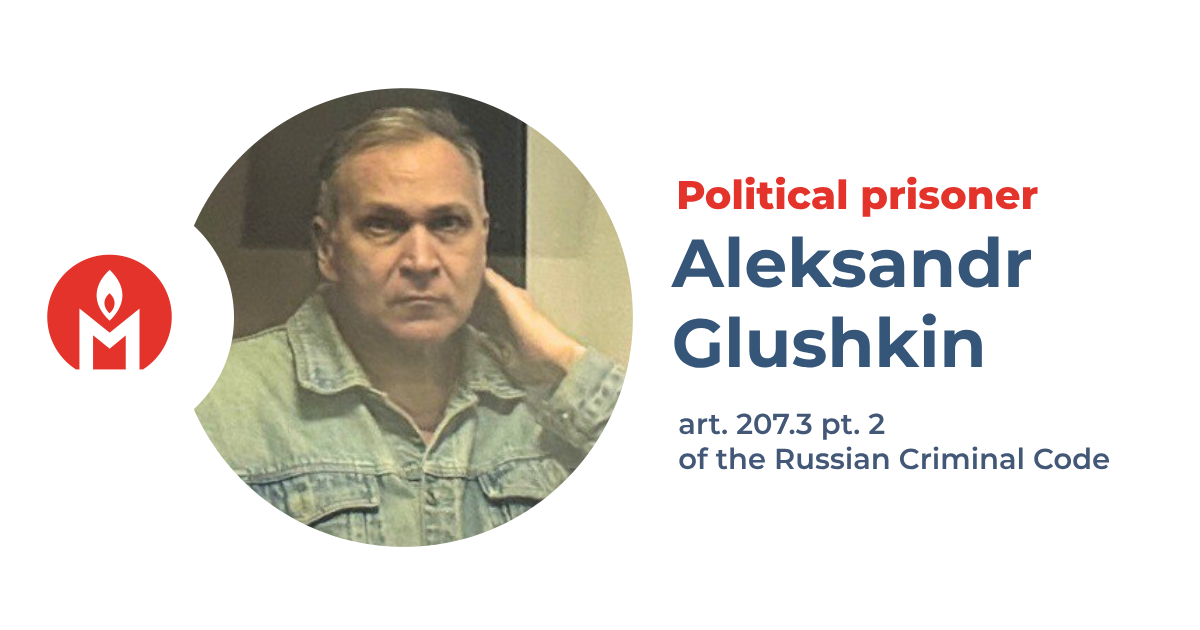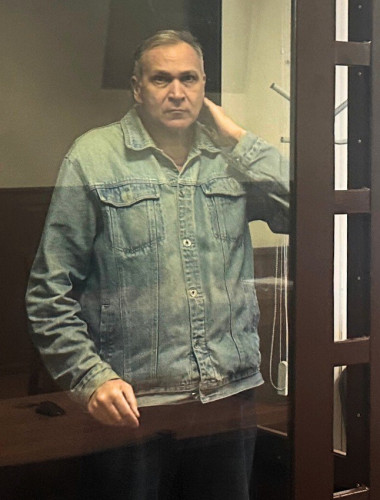Aleksandr Glushkin is a political prisoner
A school security guard from St Petersburg is being prosecuted under the ‘fake news’ law for a post on VK about Bucha
The ‘Political Prisoners. Memorial’ human rights project, in accordance with international standards, considers Aleksandr Glushkin a political prisoner. Glushkin is being prosecuted on a charge of spreading information known to be false about the Russian army for a post on VK about events in Bucha. Glushkin’s criminal prosecution violates his rights to freedom of expression and a fair trial. We demand that Aleksandr Glushkin be released and that all criminal charges against him be dropped.

What are the charges against Aleksandr Glushkin?
Aleksandr Glushkin, a 55-year-old from St Petersburg, worked as a security guard at a secondary school. In April 2022, he posted on his VK page about crimes committed by Russian soldiers in Bucha, Ukraine. A fellow staff member noticed the post after seeing the Ukrainian flag on Glushkin’s profile picture and reported him to the school’s management. Glushkin was dismissed as a result.
On 7 February 2024, Glushkin was detained on a charge of spreading information known to be false about the use of the Russian army motivated by political hatred (Article 207.3, Part 2, of the Russian Criminal Code). Initially, he was placed under restrictions on certain activities pending trial; on 8 August 2024, he was remanded in custody.
Glushkin’s trial began on 25 December 2024. Prosecution witnesses spoke about his sympathies for Ukraine and accused him of ‘speaking out against Russia.’ Glushkin pleaded guilty. He faces up to 10 years’ imprisonment if convicted.
Why do we consider Aleksandr Glushkin a political prisoner?
The offence of spreading information known to be false about the Russian army, with which Aleksandr Glushkin has been charged, was introduced into the Criminal Code shortly after Russia began its full-scale war against Ukraine. In practice, this article bans the dissemination of any information about the war that differs from the official version, in violation of the right to freedom of expression.
This offence enshrined in the Criminal Code contradicts the Russian Constitution and Russia’s international obligations, as well as fundamental principles of law. In particular, the offence undermines the principle of legal certainty since a person cannot know in advance what information may be considered false; it is even more difficult to prove whether a person knowingly spread such information. We believe all prosecutions on related charges are unlawful.
Experts brought in by the investigative authorities argued that Glushkin published the ‘falsehoods’ knowingly, since he ‘could not have been unaware of the official position of the Ministry of Defence.’ However, there is a great deal of evidence of war crimes committed by Russian forces in Bucha, near Kyiv. In our view, Glushkin had no reason to believe that the information he shared was false, let alone known to be false.
An anti-war position and efforts to draw public attention to war crimes should not be treated as criminal acts. Criticism of the war serves the public good and should not be grounds for criminal prosecution or imprisonment.
A detailed description of Aleksandr Glushkin’s case and of our position can be found on our website.
Recognition of an individual as a political prisoner does not imply the ‘Political Prisoners. Memorial’ human rights project agrees with, or approves of, their views, statements, or actions.
How can you help?
You can write to Aleksandr Glushkin at the following address:
RU: 196655, г. Санкт-Петербург, ул. Колпинская, д. 9, стр. 1, ФКУ СИЗО-1 УФСИН России по г. Санкт-Петербургу и Ленинградской области, Глушкину Александру Львовичу 1969 г. р.
EN: Aleksandr Lvovich Glushkin (born 1969), Remand Prison No. 1, Federal Penitentiary Service of Russia for St Petersburg and Leningrad Oblast, 9 (Building 1) Kolpinskaya Street, St Petersburg, 196655, Russia.
You can also send an email using the F-Pismo and ZT services (for payment with Russian bank cards), PrisonMail (for payment with other bank cards), OVD-Info and Memorial-France (free of charge).
Please note that letters in languages other than Russian are highly unlikely to reach the intended recipient.
You can donate to help all political prisoners in Russia on our website.
